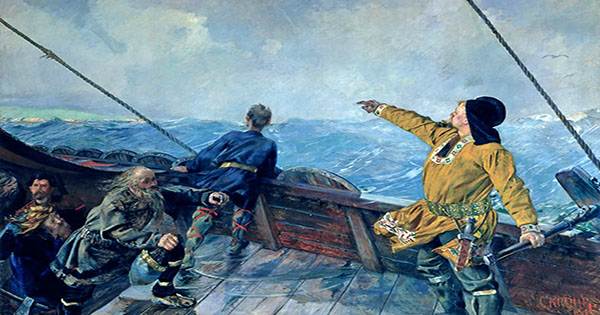Hundreds of years before Columbus sailed, word of the Viking expedition of North America appears to have reached Genoa, Christopher Columbus’s hometown in Italy. Based on a translation of 14th-century history, this finding suggests that Viking settlements in Vinland may have had hitherto unappreciated influence on following events. A manuscript called Cronica universalis was written by Galvaneus Flamma, a Milanese Dominican monk, in 1345. The original was lost, but in 2013, a 50-year-old copy was recovered. Professor Paolo Chiesa, a Medieval Latin expert at the University of Milan, has created a translation. Chiesa reports in Terrae Incognitae that a piece of the inscription alludes to Markalada, which is west of Greenland.
Markland, which is assumed modern-day Newfoundland or Labrador, is mentioned in four Icelandic sagas. Flamma attributes this information to Genoese sailors, and Chiesa interprets it as proof that knowledge of the Viking voyages reached Italy 150 years before Columbus arrived in the Americas.
“It has long been noted that the 14th-century portolan (nautical) charts created in Genoa and Catalonia offer a more advanced geographical picture of the north,” Chiesa says. “These ideas about the north-west are thought to have arrived in Genoa via shipping routes to the British Isles and the North Sea’s continental shores.”
“We are in the presence of the first reference to the American continent in the Mediterranean area, albeit in an embryonic form,” Chiesa stated. Flamma was a historian, and in Cronica universalis, he set out to write a history of the entire globe (or “all of creation”). He never finished it, which is unsurprising. Flamma, on the other hand, demonstrated an outstanding grasp of the Vikings’ expertise. He sees through Erik the Red’s PR spin and describes Greenland as barren and inhabited by white bears. Despite the fact that Flamma said Markalada was inhabited by giants, Chiesa claims it is “does not resemble the woodland Markland of the Grnlendinga Saga.”
Chiesa sees Flamma as a reliable writer because he listed his sources, admitting that he relied on oral stories frequently but employed written verification when possible. Flamma attributed stories about Markland and other northern locales to seamen, yet Genoa was his closest port.
There have been claims that Basque anglers or Malian sailors arrived in the Americas before Columbus, but these claims are widely dismissed. Chiesa also does not believe Flamma’s work proves that sailors from Genoa or other Italian cities had been there by Flamma’s time. Instead, he believes the Vikings disseminated the message. “The Genoese might have brought back to their city scattered reports about these places, some real and some fantastic,” he claims.
Chiesa does not say whether Columbus heard the same stories as Flamma. If he had, it would explain his amazing confidence in his small ships’ ability to reach land, which he persuaded the Spanish court of while grossly underestimating the size of the Earth and Asia has eastward spread. Due to the presence of people who had lived there for at least 21,000 years, it is widely assumed that Columbus did not “found” America. If Chiesa is correct, the news Columbus brought back to southern Europe may not have been completely unknown.















